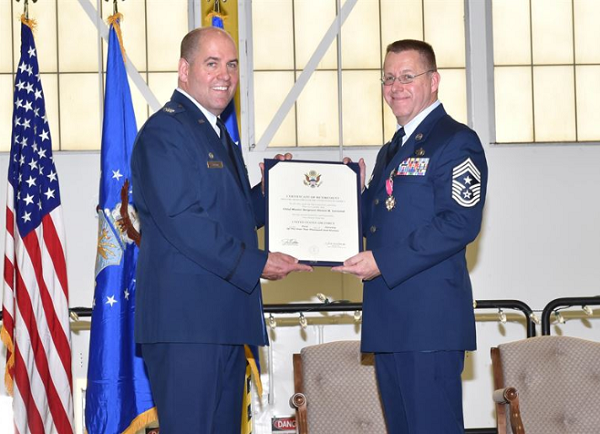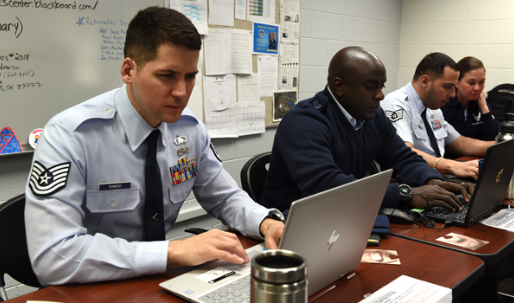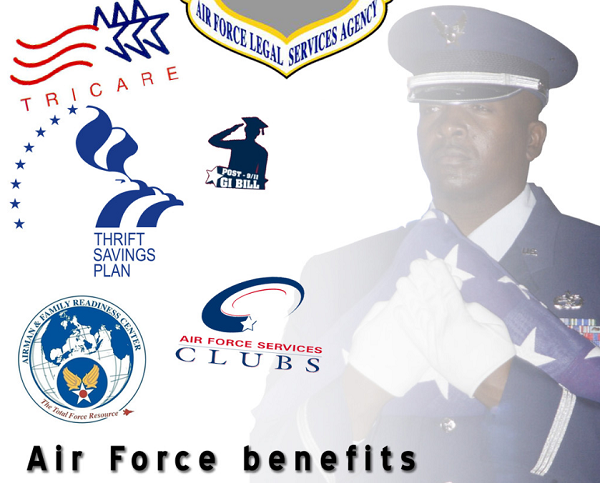Earning an extra income and working close to home are not the only benefits of joining the Air Force Reserves.
The Air Force Reserves provides a unique opportunity to receive benefits that may not be available in a civilian career.
Not only do you earn an income and earn free training in your career field, there are other benefits to assist both you and your family.
You may be considering joining the Air Force Reserves, but are unsure about insurance or other reserve benefits.
Explore the list below to find more details on five Air Force Reserve benefits that will leave you more informed.
Related Article – 10 Pros And 10 Cons Of Joining The Air Force
Jump To A Section
1. TRICARE

Finding affordable health care with a civilian employer plan can be difficult.
Not only are deductibles high and premiums expensive, most employers do not offer insurance to part-time employees.
Working in the Air Force reserves provides the benefit of participating in TRICARE Reserve Select (TRS).
Related Article – Military Child Care: 8 Great Options
What is TRS and what is the eligibility?
TRS is a premium-based health care plan that has options to cover the Reserve member or the Reserve member and family.
To be eligible you must be in the Ready Reserve (not IRR), and not be eligible for a Federal Employees Health Benefits program.
Spouses and dependents must be registered in the Defense Enrollment Eligibility Reporting System (DEERS) to be eligible.
What services are covered and where can I use it?
Well Child check-ups, annual eye exams, immunizations, maternity care, behavioral healthcare, emergency care, prescription drug coverage, and urgent care are all covered service examples, (and this list is by no means exhaustive).
Although military treatment facilities are very busy, this program allows you to have access to receiving treatment there on a space-available basis.
It is usually faster to receive service from a TRICARE authorized provider or hospital.
Related Article – Marine Corps Reserve Benefits
How much does it cost?
The cost of service depends on if you select a member-only plan, or a member plus family plan.
There are deductibles associated with the TRS plan, but they are very low in comparison to civilian health care plans.
Premium Cost:
2020 costs for TRICARE Reserve Select:
- Member only: $44.17/mo
- Member plus Family: $228.27/mo
Deductibles:
- E1-E4: 52$ per member and $104 member plus family
- E5 and above: $156 per member and $313 member plus family
Costs for specific services vary depending on if the service is provided at a facility in or out of the network.
The total catastrophic cap that you would pay for services (not including premiums) is $1,044.
Related Article – Army Reserve Benefits
2. VA Home Loans
The US Department of Veterans Affairs, better known as VA, provides benefits to those who have served and reserve members are not excluded from receiving some of these benefits.
VA Home Loans help service members and veterans purchase, build, retain, adapt, or repair a home.
The home loans are not actually provided through the VA, but are provided through private lenders, (banks, mortgage companies, credit unions, etc).
The VA will guarantee a portion of the loan.
This allows individuals to receive lower payments, lower interest rates, or other terms in their favor.
The types of loans include:
- Purchase Loans- Purchase a home with a lower interest rate, no down payment or private mortgage insurance
- Cash-Out Refinance Loan-Take cash out of your home equity
- Interest Rate Reduction Refinance Loan (IRRRL)- Get a lower rate by refinancing a current VA loan
- Native American Direct Loan (NADL) Program- Assistance for Native American Veterans for building, repairing, or improving homes on Federal Trust Land
- Adapted Housing Grant- For veterans with permanent and total service-connected disabilities to purchase or modify a home to meet disability needs
For reserve members to qualify, they must have a minimum of 6 years of service in the Selected Reserve, serve for 90 or more days on active duty during wartime, or be discharged or released from active duty for a service-connected disability.
Other eligibility terms may apply. Find more information here.
Related Article – Coast Guard Reserve Pay And Benefits
3. Retirement

Even though Reservist work part-time, (unless called to active duty), they still qualify for retirement.
Reserve members qualify for retirement after 20 qualifying years.
For Air Force Reserve retirement, the last six years have to be a creditable Reserve service.
A qualifying year is based on retirement points.
Reservists earn four points for a weekend drill and one point per day during active-duty two-week annual training, for a total of 62 points.
A qualifying year for retirement is 50 points.
Currently, there are four retirement systems, and the Date of Initial Entry into Uniformed Service (DIEUS) is how to determine which plan you fall under.
To determine retirement pay for reservists, you must first calculate the number of years by taking the total number of retirement points and dividing by 360.
Monthly Payments= base pay x number of years x 2.5%
Exact amounts vary based on the initial date of entry and the retirement system this places you into.
Most cannot receive their first retirement check until age 60.
For more information on calculating retirement pay and how to get retirement benefits early, visit the VA website here.
Related Article – 10 Best Air Force Jobs For Civilian Life
4. College Credit
As soon as Air Force Reserve members enter into Basic Military Training, they start to receive college credit.
Just for completing Basic Training, reservists receive four semester hours in Physical Education.
Once a reservist enters into Technical School, they receive additional semester hours depending on the program associated with their AFSC training.
All of these credits are provided by the Community College of the Air Force.
They are applied toward an Associate of Applied Science Degree.
According to their website, the Community College of the Air Force (CCAF) is the world’s largest community college system and awards over 22,000 associates in applied science degrees annually.
If you do not complete schooling at the Community College of the Air Force, credits are transferable to most local civilian colleges.
This is an advantageous opportunity for those in the Air Force Reserves because it allows you to earn credit while in training, then transfer your credits to continue your education and still earn a paycheck.
Related Article – Navy Reserve Benefits: 5 Benefits You May Not Know About
5. Airman Scholarship and Commissioning Program

The Airman Scholarship and Commissioning Program is an additional scholarship for those who wish to receive a degree and pursue the Air Force ROTC Program.
This program allows individuals to separate from Active Duty into the Reserves (Obligated Reserve Section) to attend college full time.
Those who are selected for the program will be a cadet and a full-time college student.
They will receive up to $18,000 per academic year in scholarships.
In addition to the scholarship funds, individuals receive textbook allowances and monthly stipends.
Monthly stipends increase with each completed year of school.
Not only do individuals selected from the program enter into the Reserves and receive additional funding, they are still eligible for Montgomery GI Bill benefits.
This opportunity is open to any two- or four-year programs in both technical and non-technical programs.
When individuals complete the program, they will commission as a Second Lieutenant in the U.S. Air Force.
This is a benefit for reservists because it can only be used when Airmen are in the reserves.
Reserve Benefits
Whether you choose to join the Air Force Reserves, or another branch Reserve component, there are benefits that you can count on to be available to you as long as you are an active reserve member.
Those benefits include:
- Drill Pay
- Life Insurance
- Educational Services
- TRICARE Insurance
- Civilian Job Protections
- Direct Deposit
Related Article – Air Force Height and Weight Requirements
Conclusion
Being in the Air Force Reserves provides benefits to support you and your family now, as well as your future career.
Having access to low-cost health insurance through TRICARE Reserve Select is a factor that may help your decision on joining the reserve component.
Most civilian jobs do not offer part-time employees insurance options, and other plans can have high deductibles and higher cost monthly premiums.
Getting a home loan or planning for retirement are not things that all individuals consider right away or until it is closer to time to need them.
The Air Force sets you and your family up for future success without you even having to plan for it.
You get home loan assistance through the VA with multiple home loan options and retirement benefits just for completing your required drills and training each year of service.
Also being provided with free college credits and scholarship opportunities can open the pathway to more civilian career opportunities.
On top of that, the Air Force reserve also offers a generous tuition assistance package to qualified candidates.
Regardless of the benefit you take advantage of, exploring your Air Force Reserve benefit options can help you make an informed decision.
Related Article – How To Get Into The Air Force Academy
References
Community College of the Air Force
- Replacing Dog Tags: 6 Things You Need to Know - June 28, 2024
- Navy OAR Test Study Guide - June 24, 2024
- 10 Best Sniper Movies of all Time - June 20, 2024
Originally posted on December 10, 2019 @ 10:19 pm
Affiliate Disclosure: This post may contain affiliate links. If you click and purchase, I may receive a small commission at no extra cost to you. I only recommend products I have personally vetted. Learn more.
